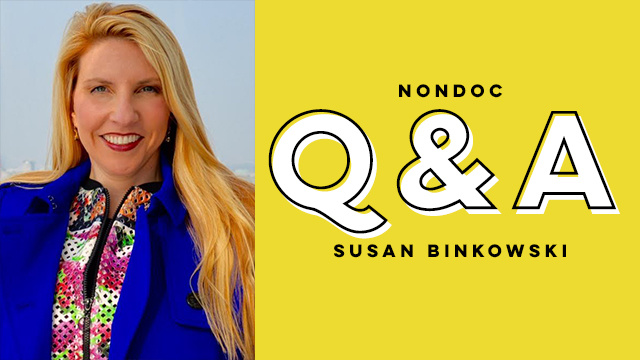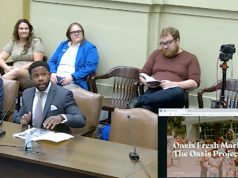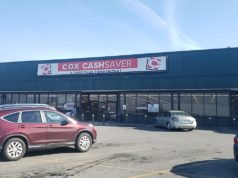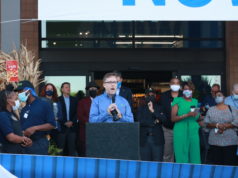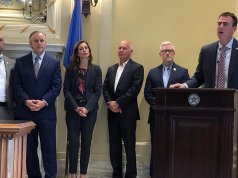
Oklahoma-owned-and-operated Buy For Less boasts more than a dozen locations in the OKC metro. The company also runs several Super Mercado and Uptown Grocery Company locations. Currently employing about 1,200 people, Buy For Less is opening a new store opening in The Village that will add another 300 to 350 employees.
In the following Q&A, NonDoc posed questions via e-mail to Susan Binkowski, Buy For Less’s president of development and the wife of founder Hank Binkowski. A self-proclaimed “disciple of Christ,” Susan opens up on the company’s motivations for a new location in northeast Oklahoma City as well as her go-to meal for a family of four.
What trends or changes have you seen in the grocery industry of late?
Well, I think it remains obvious, but the bigger the world gets, the smaller the neighborhood remains. Our stores are sometimes neighborhood and block-driven. Who lives there? What do they serve to their families? How much time can they manage to prepare, shop, feed and look at [their family members] eyeball to eyeball before the cycle goes on [to] the next day?
We see that cycle as an intimacy cycle. One that, if someone allows you into the fabric of their family and life, you can’t waste it or overlook the gravity of that decision. Statistics say that price matters: agreed. Holistic impact on the world matters: agreed. But for me, as a mom, [in] our large family, the five o’clock discussion about what is for dinner doesn’t change.
What do you think consumers want from their grocery stores?
Just make it easy. Life is complicated enough. Give me a place where my crazy life and fantastic food and value intersect. That is how we go to market.
How do you approach the marketing and sale of locally-sourced products?
We truly don’t know any other market than the local market. We aren’t an international company. We are a family business. My husband, Hank, started as a brazen one-store operator here at Penn and Hefner in 1988 with his first Buy For Less store. By the grace of God (and maybe the sheer fortitude of a Polish immigrant’s son), he had the vision to go and seek out markets that others may have overlooked … [he] was passionate about servant-hearted leadership, [which] may have been the grace that has saved us from the onslaught of other national retailers.
You have said publicly that Buy For Less attempts to represent the specific communities around its stores. How do stores differ based on location?
Look at the city of OKC. The diversity is extraordinary! Whether you need a gourmet meal for a company party or a no-frills meal for friends on the weekend, we have to step into the shoes of our guests: What do they make for their comfort foods in Edmond? What about in the Hispanic neighborhoods? What feels lavish? What are the “wow” offerings that people will talk about?
Someone recently described us as [having] “multiple-personality disorder,” but in a good way. It is our variety of fare and [ability] of our store staff and directors to listen. Their strengths have become measured in how well they respect the therapy of food in a given lot and block of our city.
Beyond profit, what’s the motivation behind your store renovation at N.E. 23rd Street and Martin Luther King Avenue? When will it open, how long has it been in the works, and what obstacles have you encountered?
Honestly, the motivation in the Northeast 23rd development — called King’s Crossings — is a God plan. We can’t own it because our vision was that we would take over a tired location and revitalize it, and then God had other plans — much, much bigger than we can comprehend. And honestly, in our own strength and resources, it will not come to fruition. It is a love offering that we have walked out in order to say, “I will come. Will you meet us there?” and the city and neighborhood has responded with a favorable “yes” so far.
I never want people to think that we ever operate without sound financial wisdom, but this project is a stretch on all fronts. That is why, if it was easy, someone would have gone before us and answered the call of a very deserved community.
What will be the anticipated result of the tax increment financing (TIF) agreement that the City set up for that area?
We are totally new to this concept. I understand the capacity that a TIF can bring when the end result increases value, makes way for projects that could not occur but for this help. The best-anticipated results are what has succeeded before, and we have an entire downtown founded on this success. So, why not the northeast community? Why shouldn’t those whose ZIP codes didn’t make round one or two of the first round [of financing] finally reap the benefits of a proven track record?
As a Christian, how do you reconcile your moral obligations with business imperatives? Have the two ever conflicted?
Well, as a disciple of Christ, there isn’t reconciliation of moral obligation. Only what is told, and what I obey. The times they conflict is when I hear what I am supposed to do, but out of our own fear, ego, selfishness and lack of vision, do we muck up the waters and stand in the way? God speaks all the time with loving words. But do we listen?
When do they conflict? When we are tempted to gauge the standards of this world’s benevolence, not Christ’s. You see, Hank and I see all that was placed in our hands as God’s. Whether we are to make the obvious, safe decision or one that requires faith sometimes depends on how connected we are in our own relationship with Him.
Oklahoma residents deal with higher rates of food insecurity than those in many other states; however, hunger is an issue plaguing children and families across the United States and the world. What is one thing people can do to help address this issue?
One of my mind-stretching friends, Tim Ulrich, of The Refuge OKC, can speak to this more eloquently and passionately than I. You see, while I work in … food, he sees the lack of it, the diminished sense of hope, and a culture that, just 10 years ago, had one in 10 children going to bed hungry. With all of the dollars given and granted, that [number has still risen] to one in risen.
Are you involved in other community initiatives? Is there one charity in particular about which you’d like people to know more?
I am a student of Elevating Hope. I read the book Toxic Charity by Robert Lupton and wanted to run screaming my apologies to those who were the recipients of my easing of guilt by giving money and food without the physical cost of time or friendship, and the disconnection that my “gift” gave in return.
What advice would you offer any young business entrepreneur?
I sit as a graduate of SALLT and [am] now a board member. I have seen the kings and queens of commerce and government and industry that have strategically wielded influence in this city. I have now been challenged by the 35-year-old and younger crowd that seems to be motivated less by security and more by impact. My word to them is: Be teachable and honor publicly those who have been honorable, and you will gain influence privately for them to share the hard stuff along the way. As Craig Groeschel has said, you can lead up. Align yourself with like-minded visionaries. Make less about what your own thing is and be more focused on how you can stack the deck on what God’s thing is. This will never disappoint you.
Imagine you have two hours to prepare a dinner for four at your house, and there is a Buy For Less down the street. What are you buying, what are you cooking and about how much are you expecting to spend?
I am a huge soup eater, thus my favorite is minestrone or vegetable soup. I grab navy beans, chicken stock or bouillon, carrots, an onion, celery, frozen peas, spicy V-8 juice and some Italian seasoning. This makes a huge pot that will last our family a week. I will add a protein such as chicken or steak if already cubed. My [expense] on this will be about $35 — dinner for four for five days.
(Correction: An earlier version of this post incorrectly stated the ratio of children going to bed hungry.)









